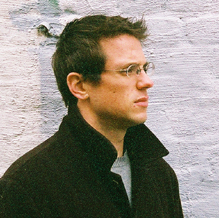 Friday, March 18, 2005
Friday, March 18, 2005
Memory slip
I'm going to stay out of the scuffle on the main page. However, there's one issue from Anthony De Mare's concert that both Anthony Tommasini and Frank Oteri bring up in their review and rebuttal, respectively--playing from memory.
One fact from Mr. De Mare's concert that they both mention, was that Mr. De Mare needed to go off stage to retrieve the score for Mr. Rzewski's work after failing to be able to perform it from memory. That took a lot of guts. And I'm glad that neither Mr. Tommasini or Mr. Oteri castigated Mr. De Mare for doing so. Rather, both give him credit for a wonderful reading of the work with the score.
So this makes me wonder, who cares if you play with music in front of you? Does it matter that much? A great performance of a work will transcend the score. When I play a concert, I've internalized the score to a point where I don't really need it--in a way I'm playing from memory. But it's nice to have it there as a reference, especially if the music is extremely difficult and complex. (I do play Stockhausen's In Freudschaft from memory, but that's because he specifies that it needs to be played from memory in the score. There is so much choreography that reading a score during performance would be impossible anyway.) It's pretty easy to tell if a performer "owns" the piece or is using the music as a crutch.
As a new music performer, I have to tip my hat to Mr. De Mare for taking on the formidable task of presenting six new works from memory. Is it necessary though? Somewhere along the line, playing from memory became the norm in piano performance. Yet I've seen some great performances where the pianist played with the score--Marilyn Nonken's recital of the complete Boulez piano sonatas stands out. Not all instruments have this tradition. But in the piano's case, does it really matter if you play from memory? I don't think it's that important.
posted by Brian Sacawa
4:36 PM
|
|
 Praised by The New York Times as "an inventive musician . . . fresh and surprising," saxophonist Brian Sacawa has firmly established himself as an important contemporary voice for his instrument. He is active as a soloist, recitalist, and chamber musician throughout the United States and is the co-founder of the new music duo Non-Zero with percussionist Timothy Feeney.
Praised by The New York Times as "an inventive musician . . . fresh and surprising," saxophonist Brian Sacawa has firmly established himself as an important contemporary voice for his instrument. He is active as a soloist, recitalist, and chamber musician throughout the United States and is the co-founder of the new music duo Non-Zero with percussionist Timothy Feeney.
He has given premieres of over thirty works by both established and emerging composers, including Michael Gordon, Bright Sheng, Andrew Mead, Oliver Schneller, Ken Ueno, Beata Moon, Hillary Zipper, and Scott McAllister, among many others. Named the Baltimore CITYPAPER’s Critic’s Choice for Classical Music in 2002, he is the recipient of awards for solo performance from both national and international competitions.
Sacawa's versatile career has led to appearances with the St. Petersburg Philharmonic, the Detroit Symphony Orchestra, the New World Symphony, Harvard Group for New Music, New Music Brandeis, Bargemusic, and at meetings of the ISU Contemporary Music Festival, World Saxophone Congress, North American Saxophone Alliance, and New England Saxophone Symposium.
Brian holds degrees from the University of Michigan, the Peabody Conservatory, and the University of Massachusetts – Amherst, where he studied with Donald Sinta, Gary Louie, and Lynn Klock. He has recorded for the Equililbrium, Naxos, and BiBimBop recording labels.
See Brian's other blog
Sounds Like Now
| |



